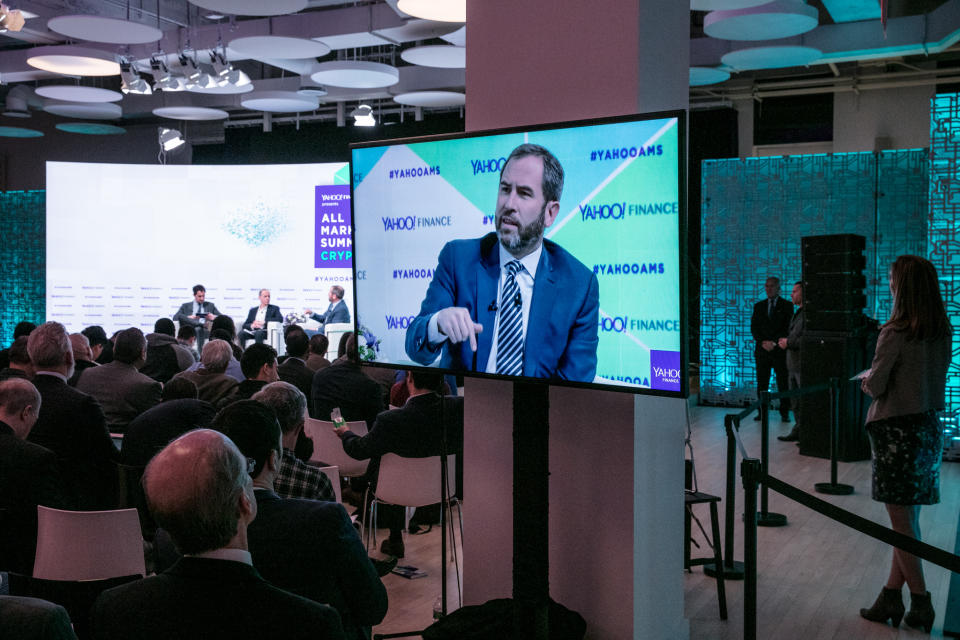Ripple CEO: 3 reasons XRP token is not a security
One week ago, SEC official Bill Hinman declared on stage at Yahoo Finance’s All Markets Summit: Crypto that the SEC does not view bitcoin or ether as securities, and thus will leave them alone in terms of SEC regulation.
Hinman did not mention XRP, the No. 3 cryptocurrency by market cap.
Now Ripple CEO Brad Garlinghouse is making his case for why XRP should get the same treatment as bitcoin and ether. Speaking on Thursday at the CB Insights Future of Fintech conference in New York City, live-streamed by Yahoo Finance, Garlinghouse presented “three key arguments” for why XRP is not a security.
As a quick refresher: Ripple is a private software company that sells products to banks and remittance firms that help them send and settle cross-border payments faster. XRP is a digital token that Ripple, the company, uses in one of its products for banks, xRapid, but does not use in its most popular product, xCurrent. Ripple and XRP are separate things, but they are constantly confused and conflated by cryptocurrency speculators and by the media—it doesn’t help matters that Ripple owns 60% of the supply of XRP tokens.
Here are Garlinghouse’s three arguments.
1. “If Ripple the company shut down tomorrow, the XRP ledger would continue to operate. It’s open-source, decentralized technology that exists independent of Ripple.”
2. “The people buying XRP, they don’t think they’re buying shares of Ripple. There’s a company called Ripple, we are a private company, we have investors… but buying XRP doesn’t give you ownership of Ripple, it doesn’t give you access to dividends or profits that come from Ripple.”
3. “XRP is solving a problem. There’s no utility in a security.”

To be sure, Garlinghouse’s arguments have to come with a heavy grain of salt. He’s making the case for XRP not being a security because Ripple doesn’t want the SEC interfering with XRP. (By the way, if the SEC were to come out and say XRP is not a security, the price of XRP would shoot up.) Cory Johnson, Ripple’s chief market strategist, made the same argument about XRP at Yahoo Finance’s crypto summit last week.
When Garlinghouse says XRP is a utility, he means that it’s used for an actual business purpose, unlike a stock certificate. Ripple utilizes XRP as a vehicle for sending funds internationally. But he ought to go back and look at what the SEC specifically warned in December: “Merely calling a token a ‘utility’ token or structuring it to provide some utility does not prevent the token from being a security.”
Most importantly, many crypto enthusiasts insist that because Ripple owns more than half the supply of XRP, the token is not truly decentralized.
Therein lies the pivotal issue. Hinman of the SEC, in his comments about bitcoin and ether not being securities, focused on the idea that Bitcoin and Ethereum have no central power. They are truly decentralized systems. On the other hand, Hinman said, “There will continue to be systems that rely on central actors whose efforts are a key to the success of the enterprise.”
At the CB Insights conference, moderator Jeff Roberts of Fortune read Hinman’s quote to Garlinghouse and asked, “Doesn’t that sound a lot like Ripple and XRP?” Garlinghouse (unsurprisingly) said no. Instead, he argued, “I think that sounds a lot like the ICO market,” where companies hold sales of newly created tokens for later use in an ecosystem that usually has not launched yet, and might never launch.
“I don’t think that our ownership of XRP gives us control… just because we own a lot of an asset,” he said. Many would disagree. And if Ripple were to unload a huge chunk of its XRP holdings, it would certainly move the XRP market.
Garlinghouse added, “I look forward to the SEC clarifying some of these things.”
Watch Yahoo Finance’s All Markets Summit: Crypto from June 14 here.
—
Daniel Roberts covers bitcoin and blockchain at Yahoo Finance. Follow him on Twitter at @readDanwrite.
Read more:
Ripple CEO: ‘There’s a lot of FUD about XRP’
Ripple CEO: ‘Don’t call it cryptocurrency’
Ripple exec: XRP is ‘crypto 2.0’
Ripple chief market strategist: Crypto regulation will ‘separate the wheat from the chaff’
Coinbase exec: ‘Adding more assets is a very big priority for us’

